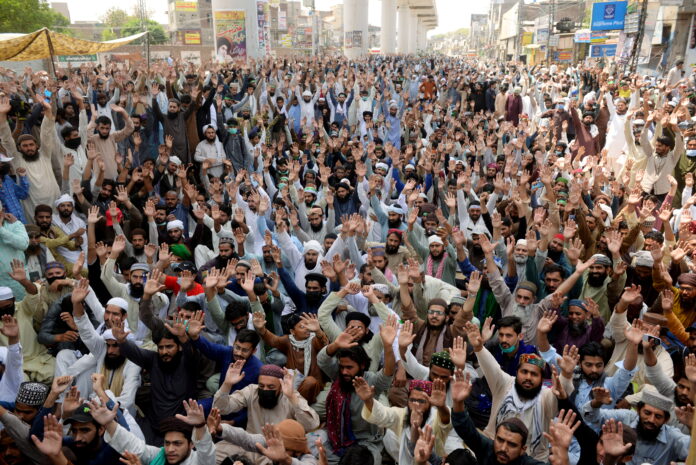
In an era where political aspirations frequently blur the lines between administration and subversion, the Pakistan Tehreek-e-Insaf (PTI) acts have aroused serious concerns. The group appears to be on a path frighteningly similar to that of the Tehreek-e-Taliban Pakistan. This worrisome alignment may have negative ramifications for Pakistan’s stability and security.
Liu Jianchao, Minister of the International Department of the Communist Party of China (CPC), led a mission to Pakistan on June 21. This tour, which followed Prime Minister Shehbaz Sharif and Army Chief General Syed Asim Munir’s visits to China, was critical for developing Pakistan-China ties, particularly the China-Pakistan Economic Corridor (CPEC). Regardless of the advances, the PTI’s ongoing efforts to damage national interests by presenting the visit as a failure exposed their antagonistic objective.
PTI appears to use the same technique as TTP. Both demonstrate a reckless disregard for national security, employing subversive techniques to attain their objectives. The PTI’s cult-like following, led by its leaders, prioritises the party’s purpose over national interests, putting the country’s well-being at risk for political gain. This tactic is not only harmful, but it is also reminiscent of the TTP’s policy of destabilising Pakistan via violence and terror for many years.
During Liu Jianchao’s visit, Pakistan’s political leadership, excluding the PTI, expressed pleasure with CPEC and continued collaboration with China. PTI’s omission is remarkable, given the considerable setbacks experienced during their term. Their opposition to the initiative and the country’s growth became clear when, rather than celebrating diplomatic achievement, they called for rallies demanding the release of their imprisoned leader. The public’s rejection of this request reflected a growing frustration with the PTI’s disruptive tactics.
On the same day, an IED blast killed five Pakistani soldiers. While the country mourned and denounced the attack, Omar Ayub, a key PTI politician, inexplicably blamed the Pakistan Army rather than the terrorists. This charge not only revealed a profound hatred towards the military but also a dangerous ignorance of the sacrifices made by the armed forces in the fight against terrorism.
Omar Ayub’s statements, calling for an emergency Commanders Conference to address a supposed ‘CPEC intelligence failure,’ were a clear attempt to create dissent and destroy the army’s credibility. He questioned the distribution of intelligence funding, implying abuse and diverting focus away from the true threat of terrorism. This language, reflecting the emotions of TTP sympathisers, implies a worrisome convergence of the PTI’s goals with those of the terrorists.
The links between PTI and TTP methods are more extensive. The PTI’s founding party formerly had a soft spot for the TTP and, during its leadership, supported the relocation of TTP-linked persons in Khyber Pakhtunkhwa. The same founding group, known as ‘Taliban Khan,’ now finds its successor on a similar road of subversion and anti-state rhetoric.
The engagement of Mohammad Iqbal, former spokesperson for Maulana Sufi Muhammad, in PTI, is a notable example of this alignment. His presence and influence within the party have instilled the same toxic ideology that drives the TTP, pushing PTI down a road of hatred and antagonism against the state and its institutions.
The Pashtun Tahafuz Movement (PTM) is another cautionary story. Under the pretext of genuine concerns, PTM pushed a hate agenda against the state, which frequently aligned with TTP aims. The PTI’s present trajectory reflects this technique, escalating minor issues into big grounds of disagreement to destabilise the country further.
Omar Ayub’s words raise serious issues about the PTI’s commitment and goals. The Pakistan Army, which has made tremendous sacrifices in combating terrorism, deserves steadfast support. Instead, PTI officials like Ayub chose to discredit the military’s achievements, calling into question their patriotism and dedication to national unity.
On the day of the Chinese minister’s arrival, Omar Ayub looked to appease foreign interests rather than promote national prosperity with his harsh critiques of CPEC and the Pakistan Army. His allegations concerning intelligence organisations and their budgets were unfounded and intended to weaken public faith in the same institutions that safeguard Pakistan’s security.
This harmful rhetoric has to be scrutinised. The PTI’s alignment with the TTP’s philosophy is more than just political opposition; it poses a threat to Pakistan’s sovereignty and stability. By fostering suspicion and divisiveness, the PTI is enabling those who wish to destroy the country.
As Pakistan navigates complicated geopolitical environments, unity and solidarity are essential. The acts of the PTI, motivated by self-serving goals and a disdain for national interests, jeopardise this unity. All political bodies must prioritise the welfare of the country over divisive agendas to ensure Pakistan’s resilience to internal and foreign challenges.
To summarise, the worrisome parallels between PTI methods and TTP philosophy highlight a serious threat to Pakistan’s stability. The country must stay watchful against such subversive activities while reiterating its commitment to unity, security, and growth. Those who prioritise political advantage above national benefit must not undermine the Pakistan Army’s sacrificial legacy or its people’s ambitions.


















Leave a Reply